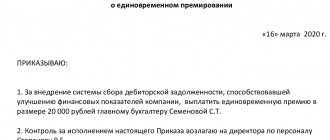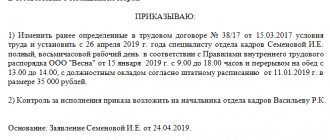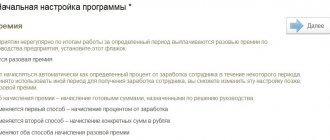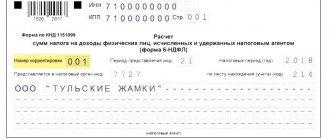Home / Labor Law / Payment and Benefits / Bonuses
Back
Published: 02/15/2020
Reading time: 5 min
0
929
- Good afternoon. The employer regularly deprives us of bonuses for unimportant reasons: being 5 minutes late, talking in the workplace, etc. As a result, we have never received the income that was promised to us when we were hired. How legal is this?
– Unfortunately for some employees, the employer can independently select the grounds for depriving employees of bonuses. But there are certain grounds when the employer’s actions go beyond the legal framework. Let's look into it in detail.
- Legal grounds
- Is deprivation of bonuses a disciplinary sanction?
- Cases when an employee cannot be deprived of remuneration
- General algorithm for depriving a bonus
- Appealing the decision
- Summary
Legal grounds
What is depreciation? Deprivation of bonuses is a measure of material punishment that is applied to employees if they commit certain offenses. In other words, the violator is deprived of compensation in the form of a bonus. Depending on the amount, deprivation of the premium may be complete or partial.
A company employee must understand for what offenses he may lose his bonus.
Labor legislation does not address this issue, but the employer must clearly state the grounds for deprivation of bonuses in the Regulations on Bonuses. In Art. 135 of the Labor Code (LC) emphasizes that the employer is obliged to prescribe the rules for assigning and paying bonuses in the Regulations on Bonuses and familiarize all employees with them. The authority to approve the payment of bonuses and its appointment belongs to the management of the organization.
If the issue of salary calculation is regulated in sufficient detail in the Labor Code, then the employer has a certain freedom of action regarding bonus rules . The employer has the right to determine at his discretion:
- Quantity, types and list of bonuses.
- The frequency of awarding the bonus and the circle of employees who are entitled to count on it.
- A list of indicators that may give rise to the right to a bonus.
- A system for assessing the value of each type of bonus and the procedure for considering the results of the assessment.
- The grounds that were the reason for depriving the employee of a bonus.
The employer also has the right not to create a separate document on the bonus procedure, but can specify all the necessary conditions in the employment contract. The conditions that the employer has provided for in its local documents should not worsen wages in relation to a particular employee. The employer should agree on the Regulations on bonuses with the trade union, and each employee familiarizes himself with it against signature.
Legal grounds for deprivation of a bonus may include:
- Violation of work schedule (lateness, etc.).
- Failure to complete the assigned task.
- Bringing employees to disciplinary action for rudeness with clients, inconsistency in performance, etc. during the bonus period (for example, in the previous period).
- The presence of a disciplinary offense during the bonus period (regardless of whether it resulted in a penalty or not).
- Dismissal during the bonus period.
- Incomplete bonus period.
- The decision of the manager, enshrined in the order, for other reasons.
The bonus can be paid in several forms : as a bonus or as an incentive. Quite often, employers include bonuses as part of their salaries: this practice is especially common in budgetary institutions, when the salary of employees may be less than the minimum wage. Bringing the income level of such employees to an acceptable level occurs through various incentive payments in the form of bonuses, so the amount of earnings can constantly change.
It is important to understand that if, according to the employer’s local documents, the bonus is an integral part of the salary, it cannot be deprived. This approach is also indicated by existing judicial practice. The courts proceed from the fact that when a person fulfills his official duties under an employment contract, he must receive the salary in full.
But the employment contract, bonus regulations or collective agreement may indicate that the bonus depends on the employee’s achievements. For example, on the size of their increase in sales volume, the effectiveness of attracting new customers, the release of a certain amount of products, the achievement of set plans, etc. In this form, the bonus may legally be reduced or not issued.
An incentive bonus is assigned at the discretion of management if the current financial situation of the company allows it to be paid.
Results
When deciding to introduce bonuses into the applicable remuneration system, the employer must work out in detail and document a description of all procedures related to the calculation of bonuses in order to exclude the possibility of recognizing them as accrued unreasonably. Particular attention is required to the issues of calculating bonuses to the head of the employer, for whom the unlawful payment of bonuses to oneself may entail a number of negative consequences, including criminal liability.
Sources:
- Tax Code of the Russian Federation
- Labor Code of the Russian Federation
- Civil Code of the Russian Federation
You can find more complete information on the topic in ConsultantPlus. Free trial access to the system for 2 days.
Is deprivation of bonuses a disciplinary sanction?
Disciplinary punishment under labor legislation is provided for failure to perform and improper performance by an employee of labor functions through his fault.
An employer does not have the right to impose a disciplinary sanction against its employee in the form of deprivation of bonuses . This is due to the fact that this type of recovery is not listed in Part 1 of Art. 192 of the Labor Code. This legal norm contains reference only to the following types of collection:
- comment;
- rebuke;
- dismissal.
The employer himself chooses the appropriate form of punishment depending on the severity of the offense committed: for example, with regular and systematic violation of labor discipline, he faces dismissal.
As you can see, deprivation of bonuses is not included in this list. Federal laws and regulations on the discipline of certain categories of employees may provide for other types of punishment: for example, a representation of incomplete official compliance, a severe reprimand, etc.
At the same time, the absence of deprivation of bonuses in the list of disciplinary sanctions does not make deprivation of bonuses illegal. The basis for depreciation may be bringing the employee to disciplinary liability in the form of a reprimand, reprimand and dismissal in the time period in which the bonus is awarded.
It is necessary to note that imposing a disciplinary sanction is a right, not an obligation of the employer (based on Article 22 of the Labor Code). Based on the results of considering the severity of the offense, the commission may come to the conclusion that there is no need to punish the employee. In such a situation, if the basis for deprivation of bonuses is the presence of an outstanding penalty, then the employer does not have the right to deprive the employee of a bonus.
Also, the employer should formalize disciplinary action and deprivation of bonuses in the form of separate orders.
Fired employees
The court of the Yamalo-Nenets Autonomous Okrug noted that the employer should not worsen the situation of dismissed employees in terms of paying them bonuses only on the grounds that they quit before the order to assign the bonus was issued. The court ruling noted that if the order to pay the disputed bonus was not issued on the day of the employee’s dismissal, this does not mean that the employer is not obligated to pay this bonus to the employee for the period of time worked (Appeal ruling dated November 10, 2014 in case No. 33- 2773/2014).
In another similar situation, the court sided with the employer and refused to satisfy the request for the recovery of an annual and quarterly bonus for the dismissed employee. At the same time, the court took into account the provisions of the local act on bonuses, according to which these bonuses are awarded only to persons who have an employment relationship with the organization (Appeal ruling of the Lipetsk Regional Court dated December 17, 2014 in case No. 33-3122/2014).
Cases when an employee cannot be deprived of remuneration
Separate reasons when deprivation of a bonus is illegal were discussed above, but, summarizing all of the above, the following reasons can be identified:
- The bonus is part of the salary.
- The basis for deprivation of the bonus is not provided for by internal documents.
- The procedure for deprivation of bonuses was violated (for example, the employee was deprived of a bonus before disciplinary action, etc.).
- There is no order to deprive an employee of a bonus if the execution of such a document is mandatory (for example, local documents indicate that deprivation of bonuses is issued by the decision of the manager or the employer needs to fix the amount of reduction in bonuses). When registering a depreciation through an order, one more important condition must be met: the employee must be familiarized with the order under his personal signature.
The employer may not issue any orders at all . For example, state in the Regulations that the bonus is awarded only based on the results of a positive financial result at the end of the quarter. In this case, in case of unprofitable operating activities, the bonus will simply not be awarded for the entire team and, in fact, there will be no reduction in bonuses.
An employer can develop a mandatory system of indicators that an employee must comply with in order to receive a bonus. If they are not followed, the employee will not receive a bonus.
If the reason for dismissal is listed in local documents, and the employee was previously familiarized with it, then the employer does not need to issue any additional orders.
Is it permissible for a pregnant woman to be deprived of her bonus? A pregnant woman can be deprived of her bonus for violating labor discipline. No concessions are provided for her: she must comply with labor discipline and job responsibilities.
The employer does not have the right to deprive an employee after the expiration of the penalty. Once the penalty is repaid, all the consequences it had are eliminated.
General algorithm for depriving a bonus
When depriving of bonuses on the basis of being subject to penalties in the current period, the following scheme will be legal: at the first stage, the employee is subject to disciplinary liability, and at the second, his bonus is deprived.
At the same time , in order to deprive an employee on the basis of bringing an employee to disciplinary action, the employer must follow the procedure established by law :
- obtaining explanations from the employee about the reasons for the misconduct (if the employee provided compelling reasons in his favor, then he can avoid penalties);
- convening a special commission to assess the misconduct;
- issuance of a collection order.
The employer chooses the form of punishment at his own discretion, but only one form of punishment is allowed for one offense (for example, for absenteeism you cannot make a remark and reprimand).
At the same time, for one offense the employer can impose a penalty and deprive the employee, and this will not become a violation. Deduction in this case should also be issued in the form of a separate order, where the basis for deprivation of the bonus will be the order of collection.
Appealing the decision
Since the employer’s right to deprive a bonus depends on how bonuses are drawn up in local documentation, an employee may not always complain about deprivation of a bonus. So, if bonuses are of an incentive nature, then complaints about deductions are meaningless . But if the bonus is part of the salary, then the employee is obliged to demand payment in full.
In order to challenge the employer’s decision to deprive a bonus, an employee can seek protection of his rights:
- to the labor inspectorate (State Labor Inspectorate - GIT);
- to the prosecutor's office;
- to court.
Based on an application to the state labor inspectorate, State Labor Inspectorate inspectors must conduct an inspection of the employing organization. If it is discovered that an employee has been deprived of funds due to him in the form of a bonus, inspectors will issue an order for the employer to pay the bonus, and will also oblige him to reimburse all untransferred funds, taking into account penalties and fines. The prosecutor's office has similar powers.
When going to court, an employee can demand not only the return of an illegally withheld bonus, but also compensation for moral damages and legal costs (compensation for damage cannot be recovered as a result of an appeal to the prosecutor’s office or State Tax Inspectorate). In order to prove the unauthorized actions of the administration, the employee must present arguments that clearly indicate a violation of labor laws . To apply to the court, an employee should prepare the following papers:
- A copy of the employment contract.
- Bonus rules, Regulations on bonuses and other documents adopted by the organization. If the employee does not have this document, then he has the right to request it from the employer, and he is obliged to provide information within 3 days after receiving the relevant request.
- An order on deprivation of bonuses or a note signed by management.
- An act of recording the violation that caused the imposition of a penalty (if any).
When preparing a statement of claim, the employee must write down:
- Full details of the employing company, position and full name of the citizen.
- Circumstances of the incident: when the employer deprived the employee of the bonus and for what reason.
- On what basis does the employee believe that the deprivation of bonuses was illegal?
- Requirements to the court: restore violated rights and return the amount of the premium, compensate for moral damage, etc.
A set of information along with the petition is sent to the court , and the applicant is notified of the hearing in written format. The employee has the right to submit an application to the court within a year after becoming familiar with the order to deprive him of bonuses. These cases are under the jurisdiction of magistrates.
What should employers do?
Obviously, a reduction in the bonus, and even more so the deprivation of money from one or more employees, may become a reason to appeal to the State Tax Inspectorate or the court. Therefore, employers must approve a local regulatory act, which will spell out the grounds for deprivation of bonuses, and familiarize employees with it.
If a subordinate has committed an offense for which he has the right to be deprived of his remuneration, it is important to understand what happened, obtain written explanations from those involved in the incident, and only after that decide whether the employee should be deprived of money.
Read more: why an employee can be deprived of a bonus








